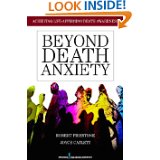Societal Defenses Against Death Anxiety
 Faced with the painful awareness of death’s finality, individuals try to recreate a parent or parents in other people, groups, or institutions, or they search for a personal savior on earth or in the heavens. Just as the imagined merger with one’s family once provided its members with an illusion of immortality, group identification offers a sense of immunity from death through an imagined fusion with the membership. In both instances, the consequences are double-edged. Perceiving one’s family or in-group as special and others as somehow inferior contributes to a feeling of belonging and safety, but it also leads to prejudicial views toward outsiders. Similarly, religious faith offers partial relief from existential dread and the awareness of being alone, yet often predisposes hostility toward those with different belief systems.
Faced with the painful awareness of death’s finality, individuals try to recreate a parent or parents in other people, groups, or institutions, or they search for a personal savior on earth or in the heavens. Just as the imagined merger with one’s family once provided its members with an illusion of immortality, group identification offers a sense of immunity from death through an imagined fusion with the membership. In both instances, the consequences are double-edged. Perceiving one’s family or in-group as special and others as somehow inferior contributes to a feeling of belonging and safety, but it also leads to prejudicial views toward outsiders. Similarly, religious faith offers partial relief from existential dread and the awareness of being alone, yet often predisposes hostility toward those with different belief systems.
Much of human aggression can be attributed to the fact that the individual conspires with others to create cultural imperatives, institutions, and beliefs that are designed to deny his/her true condition of helplessness in regard to death. These socially constructed defenses are never completely effective because despite strong belief systems, on some level people remain unsure and death fears still intrude on their consciousness. If they did work, there would be no need for prejudice and persecution and little reason to go to war over differences in religion, race, or ethnicity.
Unfortunately, people are willing to sacrifice themselves in war in an attempt to preserve their group’s, nation’s, or religion’s particular symbols of immortality. In addition, there will always be many who are willing to follow toxic, charismatic leaders in an effort to compensate for their own failings and dependency needs as well as to defend themselves from facing their aloneness and personal mortality (Lipman-Blumen, 2005).
Organized Defenses against Death Anxiety
The fantasy bond is the core defense against separation and death anxiety. This imagined fusion with the mother or primary caretaker is eventually extended to one’s neighborhood, city, and country, and is encompassed in one’s customs, religion and nationality. As such, society represents a pooling of individual psychological defenses. There are a number of institutionalized defensive adaptations that attempt to alleviate death anxiety; the most significant of which are nationalism and totalitarianism, religion, and conformity.
Nationalism and Totalitarianism
As noted, people tend to idolize their leaders, develop a mindless allegiance to causes and perceive their nation and its policies as superior to others in an unending search for immortality and security. In addition, the commitment and camaraderie among group members lends a feeling of strength to the crowd and supports a sense of safety. In merging their identity with that of a group or nation, people imagine that although they may not survive as individuals, they will live on as part of something larger that will continue after they are gone.
The transference of emotions from the early childhood dynamics with parents onto a group or cause is largely responsible for the submissive, imitative behavior observed in its members. According to Kaiser (Fierman, 1965), people’s compelling need to surrender their will to another person or group through a “delusion of fusion” represents the universal neurosis. In this form of denial, the cause represents the individual’s bid for immortality and the leader of the group becomes the “ultimate rescuer.”
Many individuals are so drawn to the personalities of charismatic leaders that they ignore the reality of their failings and remain indifferent to any immoral means utilized by them to accomplished their goals. In any political system other than a functioning democracy, the individual subordinates him/herself in relation to an idea, principle, or system, yet, at the same time, may experience a false sense of power. The illusion of fusion and connection provided by being part of a patriotic or nationalistic movement can be addictive and exhilarating. Allegiance to and identification with the in-group and simultaneous devaluation of others (“outsiders,” “immigrants,” those who do not belong), feeds narcissistic, omnipotent feelings and can imbue one with a sense of invulnerability in relation to death.
Totalitarian nations epitomize the destructive effect of collective defenses and exaggerated group identification. Although they may offer a sense of unity, there is always a substantial loss of personal freedom and independence and an increase in human rights violations.
Religion
Religion is the major defense against existential fears. For believers, it denies the reality of death on earth and assures the continuation of life in another form. Therefore, it has a powerful effect in assuaging death anxiety. For many individuals, religious faith and/or a belief in God or other deities offers a good deal of reassurance, comfort and solace, especially in times of grief. In addition, organized religion provides a social support system for its members and an outreach to help others in need in the community.
Over the millennia, religious ideologies from both Western and Eastern societies have contributed to the denial or negation of death. However, while they partially relieve death anxiety by assuring an afterlife or reincarnation, they also reinforce tendencies to denigrate and move away from bodily concerns and pleasures or attempt to obliterate personal desire and ego. Typically, Western religious belief systems offer the hope of immortality, but this is achieved to some extent by forsaking a real life in the present, a trade-off of the body that must die for the soul that will survive. Moreover, religious philosophies that equate thought with action are in essence a form of thought control that turns human beings against themselves. These judgmental values often lead to guilt and suppression that play significant roles in people’s misery. Although religious practices are typically associated with morality, in reality, they have often led to immorality in the form of religious persecution and wars against different or non-believers. Furthermore, the imposition of tyrannical rules and regulations that increase people’s sense of guilt and remorse and pose unnecessary restrictions on men and women’s nudity and sexual nature, in particular, have proven detrimental to mental health.
Dogmatic religious beliefs support attitudes of progressive self-denial. To a large extent, many people prematurely give up the only life that they have. By the time they reach old age or even middle age, they have effectively reduced their life to a repetitive, humdrum existence. Societies differ to the degree that self-denial has become a cultural imperative and those based more on an underlying religious orientation tend to be more limiting than others. In every culture there are implicit standards regarding “age-appropriate” behavior (ageism) and consensually validated attitudes that support disengagement from life in many areas of human endeavor: early retirement, segregated retirement communities, a premature giving up of participation in athletics and other physical activities, a diminished interest in sex, a reduction in sexual activity and a decline in social life.
Religion teachings presuppose that without the moral rules of a sacred text to guide them, human beings would naturally revert to living unethical, immoral lives that lack spirituality. I strongly disagree with this point of view and concur with many modern philosophers who argue that morality and spirituality can exist separate from religion. Among these is E. O. Wilson (1998), who asserted his belief that “moral values come from human beings alone, whether or not God exists. Besides, “The capacity for empathy, the emotional basis for moral behavior, has been identified by evolutionary psychologists and biologists as an innate characteristic of human beings. According to Olson (2007),”a body of empirical evidence reveals that the roots of prosocial behavior, including moral sentiments such as empathy, precede the evolution of culture and religion” (para. 3).
Conformity
The fear of death reinforces people’s tendency to conform to the conventions, beliefs, and mores of a particular group, institution, or nation. The sense of being separate and standing out from the crowd evokes existential fears. Conformity tends to strengthen a person’s illusion of fusion with the group and helps dispel death anxiety.
Many children grow up in families where the parents exert excessive control through rules and prohibitions that demand blind obedience. This conditioning leaves them easily influenced and manipulated by others throughout their lives. Their fear of leaving the security of the family for a world of personal decision making and responsibility (the fear of individuation) can be partially avoided by a strict conformity to the standards and worldviews of their society.
Nonconformity requires unusual courage because there is always guilt, fear and a sense of aloneness inherent in breaking with tradition. In addition, prejudice and acts of retaliation are directed toward people with views that oppose the general consensus or status quo. The uniqueness and free expression of the nonconformist threaten the conventional person because they raise his or her existential anxiety. Results from over 500 empirical studies based on Terror Management Theory (TMT) validate this point. “One of our earliest and most widely replicated findings is that reminders of death increase nationalism and other forms of group identification, making people more accepting of those who are similar to themselves and more hostile toward those who are different” Pyszczynski (2004), (p. 837).
The Origins of Ethnic Strife
People’s hostility and destructiveness are largely reactions to traumatic childhood experiences compounded by the painful specter of death. Polarization, i.e. the elevation of one absolutist point of view to the exclusion, even demonization, of all others, as described by Kirk Schneider (2013) in The Polarized Mind, is the age-old antidote to existential anxiety evoked by the fear of death. As noted, members of a given social group or society have a strong stake in their view of reality, and their emotional security is fractured when individuals or groups express alternative perceptions. Cultural patterns, religious beliefs, and mores that are different from our own threaten the fantasy bond, which acts as a buffer against terrifying emotions. As mentioned earlier, people will fight to the death to defend their customs and traditions against others who perceive and interpret reality differently.
Furthermore, the rapid advance of technology and subsequent increase in our destructive potential is far outracing our rationality. Unless we understand the nature of emotional pain, both personal and interpersonal, and the psychological defense mechanisms that play a major part in people’s intolerance and savagery, the human race may be threatened by extinction.
Conclusion
Faced with the awareness of death, how can an individual live a constructive life? The answer is that we can face up to our feelings and fears and live without sacrificing our integrity or resorting to deadening painkillers, dishonest manipulations, and myriad other individual and institutional defenses. To overcome prejudice and hostilities associated with ethnic differences, we need to develop a more inclusive, tolerant, and compassionate view of people everywhere. Inclusion, not exclusion, is the key to our survival. In order to achieve a meaningful peace, we need to cope effectively with existential issues and learn to live without depending upon soothing illusions and false beliefs. In a very real sense, we must feel our sadness and mourn our mortality in order to fully accept and value our existence. There is no way to banish painful memories and feelings from consciousness without losing our sense of humanity and feeling for ourselves and others. An individual can overcome personal limitations and embrace his/her life in the face of death anxiety. Such a person would not find a need to resort to ethnic hatred or warfare.
References
Fierman, L. B. (Ed.). (1965). Effective psychotherapy: The contribution of Hellmuth Kaiser. New York: Free Press
Lipman-Blumen, J. (2005). The allure of toxic leaders: Why we follow destructive bosses and corrupt politicians—and how we can survive them. New York: Oxford University Press.
Olson, G. (2007, October 24). Neuroscience and moral politics: Chomsky’s intellectual progeny. Dissident Voice. Retrieved 12/9/07 from http://www.dissidentvoice.org/2007/10/neuroscience-and-moral-politics-chomskys-intellectual-progeny/
Pyszczynski, T. (2004). What are we so afraid of? A terror management perspective on the politics of fear. Social Research, 71, 827-848.
Schneider, K. J. (2013). The polarized mind: Why it is killing us and what we can do about it. Colorado Springs, CO: University Professors Press.
Wilson, E. O. (1998, April). The biological basis of morality [Electronic version]. Atlantic Monthly, 281(4), p. 53.









As I was reading your this article
Mr Robert Firestone, I felt like as if you have put my experiences in to words putting together my feelings and insights properly to give a voice of mine by discerning it in a language so vividly and coherent to understand the human psyche.
I loved it a lot and thanks for providing for us readers to make sense out of the nonsense society makes so difficult for the ordinary and simple people like me.